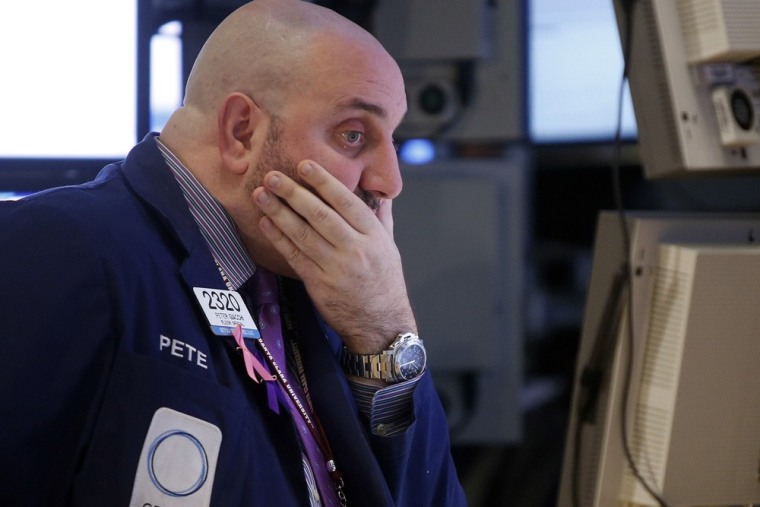
Updated at 4:10 p.m. ET: Stocks surged Tuesday, with the Dow Jones industrial average up 1 percent as the prospect of a winner in the U.S. presidential election removed a major uncertainty that has been dogging investors.
Some traders speculated the market was pricing in a victory for President Barack Obama, in part because of declines in dividend-paying issues such as utilities. The theory is that dividend taxes would rise under Obama but not necessarily under Republican challenger Mitt Romney.
Yet other investors pointed to gains in defense shares that could point to a victory for Romney, who has promised to increase defense spending.
The main concern for many investors was the possibility that the election would not be decided by the end of the night. Art Cashin, director of floor operations for UBS Financial Services, noted that each party has dozens of lawyers scouring the country for potential voting irregularities, raising the possibility of multiple challenges.
"I think the worst thing for the market would be if this is very close and is questioned and instead of having one Florida we wind up with six of them," said Cashin. "Then we’ll go rushing to the fiscal cliff without any certainty or anybody in place, and that I think might scare the heck out of the market."
Rick Meckler, president of hedge fund LibertyView Capital Management LLC in Jersey City, N.J., agreed, saying nobody wanted to see a repeat of the Bush-Gore election of 2000, which went undecided for six weeks.
"There's been a lot of talk that once the election is decided, no matter how it went, just to the have the uncertainty over would be good for the market," Meckler said.
The Dow Jones industrial average rose 133.24 points to close at 13,245.78. The Nasdaq composite index was up 0.4 percent, while the S&P 500 rose 0.8 percent.
The rally fell a bit short of the strange euphoria that greeted Election Day 2008, when the Dow climbed 305 points in the volatile environment of the massive financial crisis that was gripping global markets. The Dow fell nearly 500 points the next day.
Cashin said stocks are likely to be little changed Wednesday if there is a clear winner, either Obama or Romney.
Polls showed Obama and Romney neck-and-neck in a race that will be decided in a handful of battleground states. A change in political leadership could affect sectors such as healthcare, energy and financials.
Investors will also closely watch races in the Senate and House of Representatives that will affect the "fiscal cliff," or $600 billion in spending cuts and tax increases that are set to be automatically triggered at the end of the year unless a deal is reached between Congress and the White House.
"I think people are kind of feeling like, 'Hey, we're going to have an answer to the election. The uncertainty is still there, but we know that the end is very near," said Bryant Evans, investment adviser and portfolio manager at Cozad Asset Management, in Champaign, Illinois.
Here's how the stock market has fared in other recent election days:
- Nov. 6, 1984: Hours before Ronald Reagan beats Walter Mondale in a landslide for re-election, and with the economy healing after a deep recession, the Dow climbs 14 points to 1,244.
- Nov. 8, 1988: The market enjoys a strong morning in anticipation of a victory by George Bush over Michael Dukakis. It holds only a fraction of the gain, and the Dow ends up two points at 2,127.
- Nov. 3, 1992: An uneventful session one day after a rally based in part on speculation that a Bill Clinton presidency wouldn't hurt the markets. The Dow ends down nine points at 3,252.
- Nov. 5, 1996: In the middle of a historic bull market, investors embrace hope that Democrat Clinton and a Republican Congress will keep each other in check. The Dow rises 39 to 6,081, within 13 points of its all-time high.
- Nov. 7, 2000: George W. Bush and Al Gore go to the wire, and investors hold their bets. The Dow closes down 25 points at 10,952. The Dow slides as much as 5 percent during the five-week fight over the Florida vote.
- Nov. 2, 2004: After a five-day winning streak, the market confronts the prospect that the race between George W. Bush and John Kerry won't be settled on Election Night. Late selling pushes the Dow down 18 points to 10,035.
The Associated Press and Reuters contributed to this report.